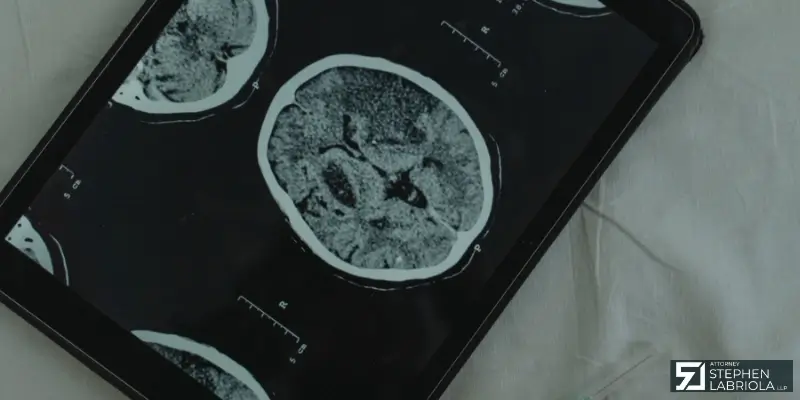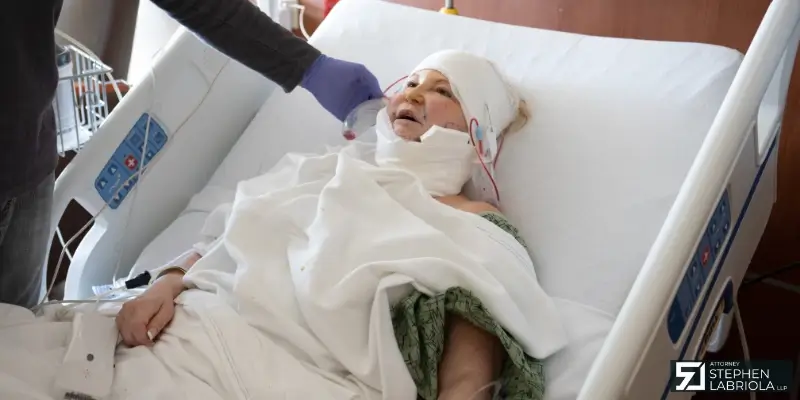|
|
Last Modified on Jul 10, 2025
Few injuries lead to the lasting harm of a traumatic brain injury. Whether the injury resulted from an assault, medical error, or other cause, understanding what to expect in a traumatic brain injury lawsuit can be a critical first step toward securing the compensation and accountability that you are owed. A traumatic brain injury attorney can explain the state’s traumatic brain injury laws and how the civil courts provide a pathway to securing fair compensation for your injury.
When You Should Hire a Traumatic Brain Injury Lawyer
If your traumatic brain injury was caused by someone else’s negligence, the time to act is now. The decision to hire a traumatic brain injury lawyer greatly improves your chances of securing a favorable outcome to your traumatic injury claim.
Delays in taking action may only harm your case. This is due to the importance of gathering supportive evidence to back your claim. Georgia law sets strict deadlines for filing injury claims, making early action crucial for protecting your rights. Documenting early symptoms can position you for a successful claim that allows you to rebuild your life with the financial resources you need.
TBIs are not uncommon in Georgia, and many injured victims can successfully hold the party or parties that caused their injury accountable in court. In 2023, Georgia’s Brain & Spinal Injury Trust Fund Commission recorded over 30,000 suspected traumatic brain injuries, many of which required legal attention. Facilities like Emory University Hospital often treat serious brain injuries, and having a lawyer can ensure the cost of that care isn’t left to you alone.

Gathering Evidence
Before a claim can be filed in court, you’ll need to work with an attorney to gather evidence to support your claim. A TBI attorney can work with outside consultants, doctors, and accident reconstructionists to build your case.
These early steps involve reviewing imaging scans, medical records, and treatment plans. Falls and other causes lead to 74,000 hospitalizations at Grady Memorial Hospital and other hospitals in Georgia every year. Many of these accidents cause serious head injuries that Georgia law treats differently from regular injuries.
Not every TBI provides grounds for legal action, but many do, especially when you focus your efforts with the help of an attorney who handles these types of cases.
Filing Your Claim
Filing a traumatic brain injury claim in Georgia involves preparing documentation that outlines how your injury occurred, its impact on your daily life, and the financial burden it has created. Your attorney can submit this claim to the appropriate insurance carriers or file a civil suit if negotiations stall.
With roughly 400,000 patients harmed in hospitals nationwide each year, many TBIs result from medical negligence. Documenting these incidents and taking the proper steps to file in court can play a critical role in protecting your right to secure compensation.
Negotiating a Settlement and Potentially Going to Trial
The vast majority of civil cases are resolved through negotiated settlements outside of trial. By gathering compelling evidence and going to court, you can position yourself to receive a fair settlement that fully compensates you for the physical, emotional, and financial harm you suffered.
It is not uncommon for settlement negotiations to go through multiple rounds. If the defendant drags their feet by not offering fair compensation within a reasonable timeframe, your attorney can set a court date to signal that you take your rights and claim seriously.
Accepting a settlement does not always mean that the defendant admits responsibility, and a closed case would end your options for pursuing further damages for that injury. This is why consulting closely with your attorney throughout the process is critical.
If your case proceeds to trial, your attorney can represent you by presenting evidence, questioning witnesses, and making arguments designed to secure a favorable verdict.

FAQs
What Is the Average Settlement for a Traumatic Brain Injury?
There’s no average settlement for a traumatic brain injury in Georgia because each case is unique. Settlement amounts vary widely based on how serious the injury is, how it impacts your life, and how strong the evidence is. Traumatic brain injury claims often involve complex medical evaluations, long-term care projections, and special testimony.
How Much Compensation Can I Receive for a Traumatic Brain Injury?
The amount of compensation you receive for a traumatic brain injury depends on your medical costs, the impact on your ability to work, and the long-term effects of the injury. You may be eligible to recover damages for lost wages, future care, and pain and suffering. A strong claim backed by consultant opinions and detailed documentation can increase your chances of receiving full and fair compensation.
What Should You Avoid Doing After a Traumatic Brain Injury?
After a traumatic brain injury, you should avoid skipping medical appointments, posting about your injury on social media, or discussing your case with insurance companies without legal advice. These actions can weaken your claim or be used against you. It’s also important to follow all medical recommendations and avoid activities that could worsen your condition.
What Is Considered a Moderate to Severe Traumatic Brain Injury?
Moderate to severe TBIs typically involve loss of consciousness, memory loss, or clear neurological damage visible on scans. Other TBI symptoms may include confusion, slurred speech, seizures, or long-term cognitive problems. These injuries often require extended hospital stays, rehabilitation, and ongoing care. Diagnosis usually involves neuroimaging and specialist evaluations to determine the full extent of the damage and prognosis.
Injured Due to a Traumatic Brain Injury? Call Attorney Stephen T. LaBriola Today
Life after a traumatic brain injury carries many challenges, but financial hardships should not be one of them. If your injury was caused by someone else’s negligence or misconduct, you may have grounds to pursue a personal injury claim. Attorney Stephen T. LaBriola has decades of experience handling complex brain injury cases throughout Georgia.
Stephen T. LaBriola is a summa cum laude graduate of the University of Colorado and earned his law degree from NYU School of Law. He has handled high-stakes injury cases across Georgia for over 30 years and holds an AV Preeminent rating from Martindale-Hubbell. Contact his office today to schedule a consultation and take the first step toward holding the at-fault party accountable.




